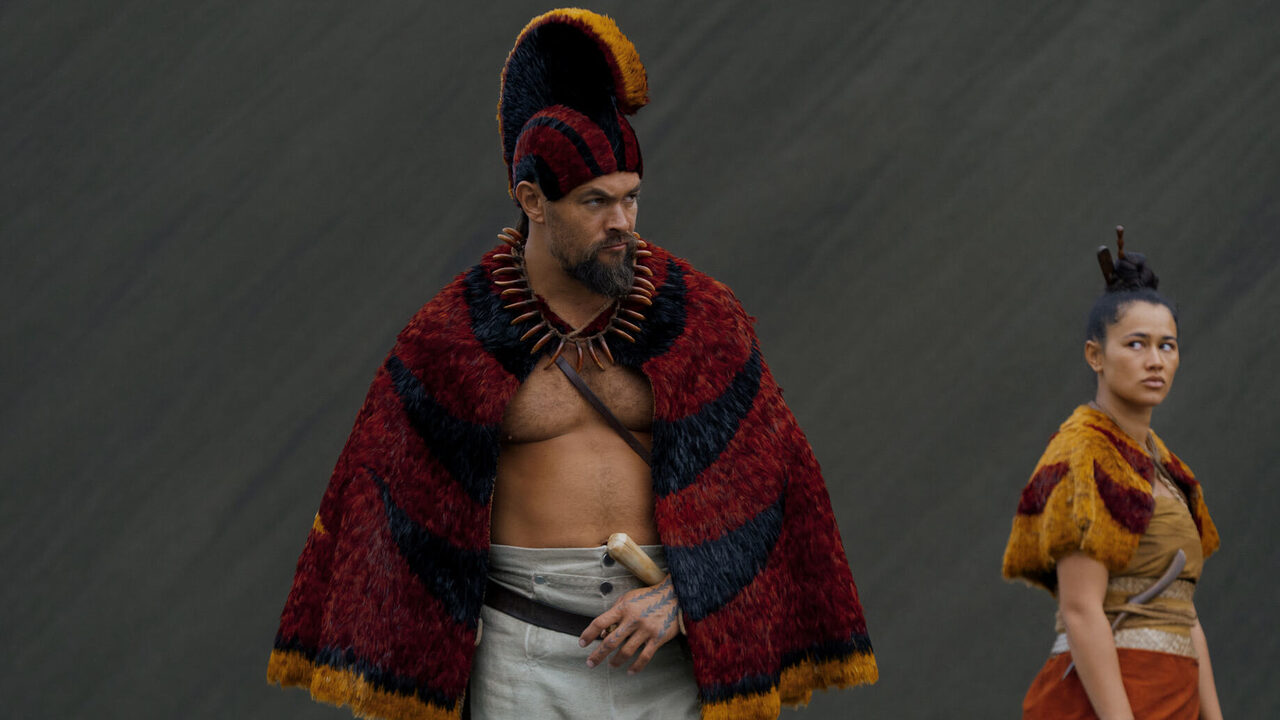
I went into this episode expecting war drums, only to find myself drawn instead into quieter currents of moments of hesitation, regret, and whispered diplomacy. Chief of War has always balanced spectacle with intimacy, but here it leans firmly toward the latter. The result is layered and compelling, though at times uneven in its pull.
The story centers on Kupouhi’s steady efforts to temper the flames of conflict. She is no longer simply an emblem of loyalty or devotion but a figure marked by choices that weigh heavily on her. Her attempt to broker peace is powerful precisely because it comes from a place of regret: her decision to stand with Kaʻiana over Namake lingers in every measured word, and the camera often lingers on her silences as much as her speech. It’s a nuanced performance that carries the moral weight of the episode without ever lapsing into sentimentality.
Kaʻiana himself faces a crisis of conviction. He brings war supplies and strategy, expecting clarity, but instead finds unease. His confidence in Kamehameha falters as he questions whether his chief’s restraint represents wisdom or weakness. These doubts are not presented in grand declarations, but rather in hesitant pauses, sidelong glances, and carefully chosen words. That kind of restraint gives the story its tension, replacing battlefield clamor with the suspense of waiting for someone to take a side.
Visually, the series continues to be impeccable. The landscapes remain more than just backdrops; they feel like characters in themselves. The shimmer of sea light on paddles, the flicker of torches during tense meetings, and the deep shadows of volcanic stone give the narrative a mythic texture without straying from realism. The cinematography carries an authenticity that suits the story’s gravity, but it also maintains a painterly eye that elevates what might otherwise be long stretches of dialogue into something cinematic.
That said, the deliberate pacing is both a strength and a weakness. The slow burn deepens the drama, but it also risks drifting into stillness. Too much of the supporting cast fades into the background, their conflicts hinted at rather than fleshed out. Keoua’s presence, though significant in past actions, lacks sharpness here. We know his torching of Kohala continues to haunt the narrative, but this episode doesn’t fully ignite his role in the present. For a story so dependent on the interplay of rival leaders, leaving these edges softens what could be a sharper blade.
Still, the quieter focus allows emotional threads to stand out. Kupouhi’s courage and Kaʻiana’s hesitation feel all the more striking against the subdued backdrop. The absence of large-scale action makes us more attuned to every small shift in loyalty, every tremor of doubt. It’s a gamble, but it pays off in the way tension accumulates beneath the surface.
The dialogue matches the visual tone: lean, deliberate, and cautious. No single speech overstates the stakes. Instead, unease is communicated through what is left unsaid. There’s a respect for the viewer’s ability to read between the lines, which I appreciate, even if it occasionally verges on opacity. Sometimes the episode feels like it’s holding too much back, as if saving its loudest voice for later chapters. That restraint lends dignity, but it can also leave you wishing for one or two sharper emotional peaks.
By its closing moments, however, the weight of what has unfolded settles in. Peace feels increasingly precarious, the promise of unity increasingly fragile. Kaʻiana’s shifting stance suggests deeper fractures ahead, and Kupouhi’s quiet strength carries a poignancy that lingers. There is no sudden rupture, no decisive climax, but the sense of unease is unmistakable. The war is not yet raging, but you can feel the ground trembling with its approach.
Overall, the episode impresses with its atmosphere, its performances, and its commitment to complexity. It avoids easy spectacle, offering instead an intimate portrait of characters caught between loyalty and survival. At the same time, its measured pace and occasional narrative hesitations mean it doesn’t always grip as tightly as it could. The result is thoughtful, beautifully made, and quietly haunting, though not without its moments of frustration.
For me, the real achievement lies in how it makes the waiting meaningful. This isn’t filler, nor is it empty calm before the storm. It’s the slow tightening of a knot, the kind of storytelling that demands patience but rewards attention. And while I sometimes wished for sharper turns or clearer signposts, I ended the hour feeling invested in the characters’ dilemmas and anxious about where their choices would lead.
The Splintered Paddle may not deliver the thunder of war, but it offers something more measured: a meditation on loyalty, power, and the uneasy silence before the clash. It’s an episode that proves stillness can be as unsettling as any battle, though it also leaves me eager for the next wave to finally break.
Final Score- [5.5/10]
Hi Everyone, after a due consideration, we have decided that we will be open for donations to help us in managing our website. We will be greatful for any kind of amount we receive. Thanks!
— Midgard Times 🎬 (@Moviesr_net) January 4, 2026
PayPal- [email protected] pic.twitter.com/DlNNz5Npm5
Get all latest content delivered to your email a few times a month.
Bringing Pop Culture News from Every Realm, Get All the Latest Movie, TV News, Reviews & Trailers
Got Any questions? Drop an email to [email protected]